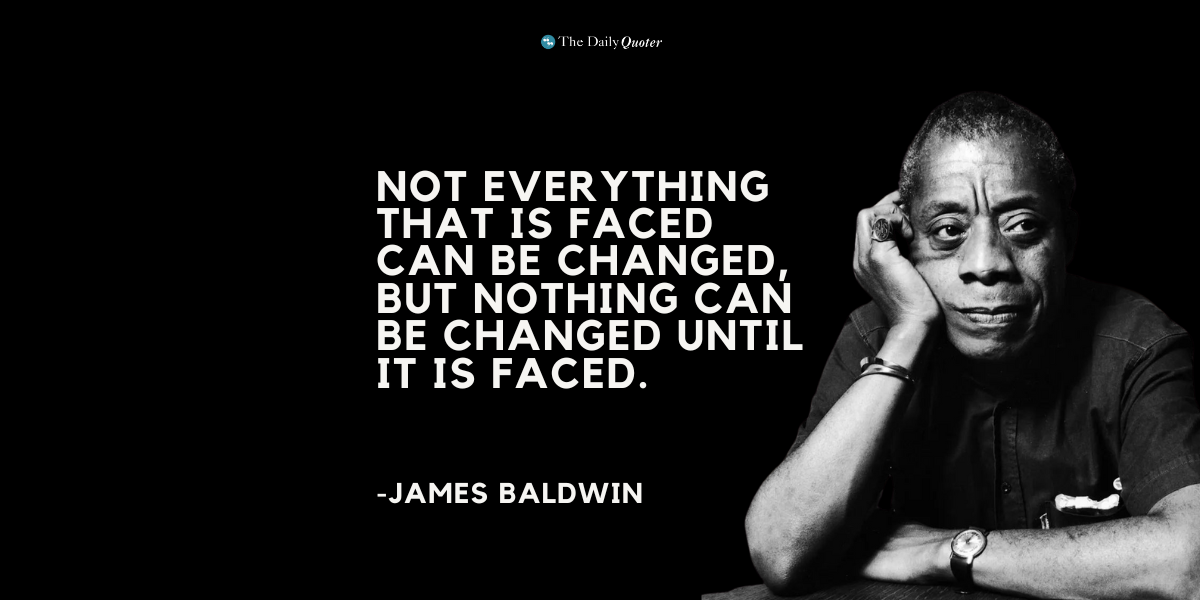Baldwin’s profound statement, “Not everything that is faced can be changed, but nothing can be changed until it is faced,” from an essay for The New York Times published in 1962 encapsulates a pivotal principle in effective problem-solving and personal growth.
James Baldwin (1924-1987) was a prominent American writer, civil rights activist, and public intellectual. He garnered acclaim for his work across various forms, including novels, essays, plays, and poems. His eloquent and passionate explorations of race, identity, and social justice made him a crucial voice in the 20th century.
A multifaceted intellectual figure whose powerful voice continues to illuminate important conversations about race, identity, and humanity.
Here are some key aspects of his life and legacy:
Literary Contributions:
Highly acclaimed works: Novels like “Go Tell It on the Mountain” and “If Beale Street Could Talk” explored the Black American experience with raw honesty and lyrical beauty.
Powerful essays: Collections like “Notes of a Native Son” and “The Fire Next Time” offered unflinching critiques of racism and segregation, while also advocating for love, empathy, and understanding.
Versatility: His writing extended beyond race, tackling themes of sexuality, family, and personal struggles with profound insight.
Civil Rights Activism:
Vocal advocate: Baldwin actively participated in the Civil Rights Movement, delivering powerful speeches and engaging in public debates on crucial issues like racial equality and social justice.
International voice: He spent a significant part of his life abroad, offering a unique perspective on race relations in America from an international vantage point.
Influence: His work and activism deeply impacted both national and international conversations on race, inspiring generations of artists, activists, and writers.
Legacy:
Enduring relevance: Baldwin’s works remain critically acclaimed and widely read, their themes resonating deeply with contemporary audiences.
Cultural icon: He is recognized as a major figure in American literature and activism, influencing diverse fields like literature, film, music, and theater.
Inspiration for change: His courage to confront difficult truths continues to inspire ongoing struggles for racial and social justice.
The quote underscores the values of:
The content below was originally paywalled.
Proactive Identification: Ignoring issues allows them to fester and potentially escalate. Confronting challenges directly, even if uncomfortable, enables formulating solutions and mitigating negative impacts.
Objective Assessment: Denial or avoidance impede accurate evaluations. Openly acknowledging situations allows for thorough analysis, leading to effective strategies and informed decision-making.
Resilience and Adaptability: Embracing challenges fosters development of coping mechanisms and adaptability, crucial for navigating unforeseen circumstances and evolving environments.
Effective Action: The first step towards positive change is recognizing the need for it. Facing challenges paves the way for proactive measures and collaborative efforts to drive improvement.
While some situations may remain unalterable, accepting that reality allows for focusing energies on manageable aspects and seeking alternative solutions.
In essence, Baldwin’s wisdom emphasizes the necessity of confronting difficulties for professional success and personal evolution. His words serve as a powerful reminder that growth and positive change often begin with the courage to face what lies ahead.


Leave a Reply